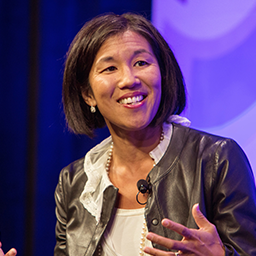The International Association of Privacy Professionals named Nicole Wong its 2021 recipient of the IAPP Privacy Leadership Award. Wong accepted the honor during a virtual ceremony as part of the IAPP’s Global Privacy Summit Online 2021.

The award recognizes privacy professionals with an "ongoing commitment to furthering privacy policy, promoting recognition of privacy issues and advancing the growth and visibility of the privacy profession."
Wong's decorated resume is highlighted by her term as deputy U.S. chief technology officer, as she advised the Obama administration on policy matters related to the internet, innovation and privacy. She has also served as legal director at Twitter, vice president and deputy general counsel at Google, and a partner at Perkins Coie.
"I am so grateful to be honored with this award from the IAPP, which over its 20-plus year history has become a focal point for the privacy community and an incubator for developing talent," Wong said. "It's a privilege to join this esteemed group of awardees who have come before me. Many are friends and all have been pioneers in the field of privacy and models of creative and courageous leadership."
Wong admitted privacy "wasn’t a profession at the time I was making career decisions" in the late 1990s, so even she is still growing in the everchanging field. However, being able to grow as the profession does has allowed Wong to realize what it takes to be an effective leader in the space. It starts with an attention to detail, which she said "is the foundation of strong work." Another key is avoiding a narrow view on what have undoubtedly proven to be complex issues presented by the privacy landscape.
"My approach to privacy has always been a holistic one," Wong said. "Looking at the whole product, the technology and regulatory landscape in which it sits. But most importantly, considering the users’ and public’s expectations. I think the strongest privacy leaders have that broad view in mind with each new feature, product or innovation."
The proudest moments of Wong's career undoubtedly came while working at the White House under former President Barack Obama. Wong's expertise proved invaluable as the administration attempted to tackle privacy, national security and global public policy interests through a 90-day study assessing the public policy implications of big data and machine learning. Wong believes the findings remain urgent today.
"First, across public and private sectors, the most common and urgent message was that people felt a profound asymmetry of power between individuals and the companies that collected and used their data," Wong said. "Second, when you asked people what they were most concerned about, sometimes they talked about privacy, like concerns about identity theft or government or corporate surveillance. But often they talked about being worried about being overlooked or denied opportunities because of information about them. … The distinction between data privacy and data fairness raised important questions about whether we have the right frameworks and the right policy tools when it comes to data governance."
Those issues are just two in a mounting pile that privacy professionals and policymakers continue grappling with, making this an inflection point for data governance and a time to think creatively, according to Wong.
"I am excited to see the innovations in building a decentralized web and decentralized storage," Wong said. "I think there is important technical and policy leadership in the current work around data stewardship and data trusts. I think we, as citizens, need to urge our policymakers and political leaders to be bold in finding new governance forums, like the local-level privacy commissions and algorithmic decision system task forces that are popping up around the country.
"I am excited about this moment when privacy nerds enter the policy sphere and look forward to supporting their work."
Photo by Jason Leung on Unsplash

